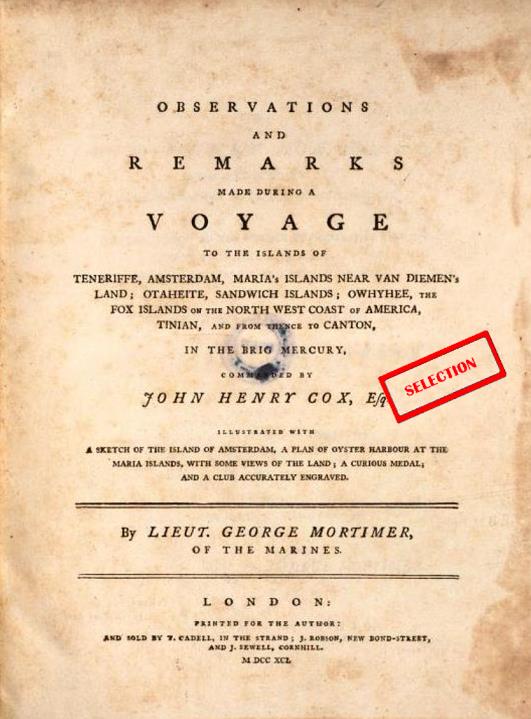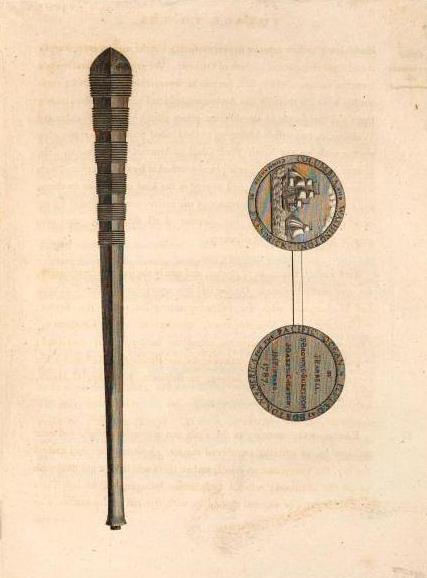|

|
. . . .
[1789. September 20] At six in the evening of the 20th, we saw the Island of Owhyhee, extending from North North West to North West, distant about twelve leagues. Early next morning, being well in with the land, we sailed along shore, and saw several villages and a great many of the inhabitants; one of whom waved a piece of white cloth to us as an invitation to land, for it blew too fresh for them to venture off to us. In the afternoon it fell calm; and, notwithstanding there was a great swell, several canoes came off to us, with people of both sexes: they brought with them both fresh and salt fish, packages of salt, fishing-lines, and small pigs, which they bartered with us for nails. We were obliged to carry on our traffic with them by signs; for though their language is very similar to that of the |
[1789. September 21] Otaheiteans, their pronunciation is so very thick and guttural, that we could neither comprehend them, nor make them understand what little we had acquired of the Otaheitean tongue. A favourable breeze springing up in the evening compelled our visitants to leave us, except a man and two women, who staid on board all night. [1789. September 22] In the morning, we attempted to get into Karakakooa Bay, but were prevented by the wind's failing us. A great number of canoes now came off to us, and we commenced a brisk trade with the natives for hogs, salt, cordage, cloth, spears, ornaments of feathers, &c.; all of which they exchanged with us for different-sized spike nails, which they preferred to every thing else that we offered them. We missed several articles today, that had been conveyed out of the ship by the natives, whom we soon found were as expert thieves as those of Otaheite. [1789. September 23] It continued calm till the evening of the 23d, when we took advantage of a light air and got into Karakakooa Bay, where we anchored with the small bower in nine fathoms. Before we came to an anchor, the king of Owhyhee, Maia Maia, honoured us with a visit, accompanied by Tiana, a chief of the Island of Otooi, who expressed great pleasure and surprize at the sight of Captain Cox, who had seen and entertained him at his factory at Canton; he having been taken there by a vessel employed in the fur trade, and brought back again on her return on another voyage. I was informed by Mr. Cox that this man’s extraordinary size and majestic appearance, he being nearly fix feet four inches high, and remarkably stout and well made, got him the appellation of the Great Stranger among the Chinese, for whom he entertained the greatest contempt. He |
[1789. September 23] used frequently to appear while at Canton in the dress proper to his country; and upon these occasions Sally forth brandishing a Sandwich Island spear in his hand, to the great terror of the Chinese: but though Tiana made such a formidable appearance, he was of a very mild disposition, bordering upon childishness; and used while at Canton, to sit for hours together in a room playing with two white rabbits given him by Mr. Cox, running after them, and imitating their motions by couching and squatting upon his hams. The king and Tiana brought the captain presents of a helmet, and two beautiful cloaks richly interwoven with scarlet and yellow feathers; for which he received a very handsome acknowledgement from him. His majesty is one of the most savage-looking men I ever beheld, and very wild and extravagant in his actions and behaviour: his body, in common with those of many of his subjects, was full of small ulcers; which may be occasioned by drinking the ava, and their eating a great quantity of salt and salt fish: he would not partake of our dinner; and told us, that both pork and plantains were at that time tabooed or forbidden them: but though he would not make one at our meals, he would gladly have taken up his abode with us and slept on board with his wife;, and seemed much disappointed at being refused. On the 24th, I went on shore with the captain in a canoe of Tiana's and saw the king's house, which is very neat and commodious: he has got two two-pounders and two swivels mounted before his house on a raised platform of stone; the two-pounders have proper carriages, and the swivels they have mounted on blocks of wood; the touch-holes are secured with pieces of cloth tied round them, and the ramrods and spunges laid in order at their sides, so that they have quite a martial appearance. These guns were given to the king by the captain of the above-mentioned vessel, who |
[1789. September 24] touched here on his return to China from a voyage to the North West Coast of America. A party of us went on shore in the afternoon to the village of Kowrowa, where Captain Cook was killed, and were shewn the identical spot where that unfortunate and great man fell: a tree still remains near the place perforated by a cannon-ball which was fired from one of the ships during the scuffle, and serves as a memento of that unhappy affair. Maia Maia was on board almost the whole of this day, and was continually teasing us for guns and gunpowder, especially the latter article, which he used a variety of artifices to procure. We had several striking instances of the authority of the chiefs of this Island over the inferior class of people; one in particular, on our first landing at Kowrowa, where the crowd of people collected together to see us made such a noise that we could scarce hear one another speak; which being observed by a chief who was with us, he only waved his hand to them, and in an instant the whole multitude were silent: and afterwards, when we were going to see the Morai, or burying-place, where Captain King was stationed with his party at the time of the death of Captain Cook, being followed and pressed upon by the natives upon our near approach to the Morai, the man who conducted us drew a line across the sand with a wand that he carried in his hand, and no person but ourselves presumed to pass it, or were suffered to enter the Morai. The great authority of the chiefs, and their living in towns or villages, so different from the natives of Otaheite, form a distinguishing contrast between the manners and customs of the two nations: their canoes likewise are strikingly different, those of the Sandwich ' |
[1789. September 24] Isands being greatly superior in every respect; but the natives are neither so comely nor so well clad as those of Otaheite. We procured several medals from the natives at Owhyhee, some as presents, others by purchase; these medals were left them by the Americans, and had been distributed among them and the people of the different places visited by the Columbia and Washington, two vessels belonging to the United States, and employed in the fur trade on the North West Coast of America. The medals seem to have been left at the different places touched at by the Americans, with a view to commemorate the first voyage of the kind undertaken by them, and to fix them in the remembrance of the natives; in my opinion a very excellent plan, and worthy the imitation of all future navigators who may be sent on voyages of discovery. The medals, which are of pewter, and nearly the size of a crown-piece, are very neatly executed. On one side is a representation of the Columbia and Washington, with the following inscription round the border: ."Columbia and Washington, commanded by J. Kendrick." On the reverse, the inscription round the border is thus continued: "Fitted at Boston, North America, for the Pacific Ocean;" and in the centre, "By J. Barrel, S. Brown, G. Bulfinch, J. Darby, C. Hatch, J. M Pintard, 1787." [1789. September 25] Early in the morning of the 25th, we got under weigh, and were followed by an amazing number of canoes. Soon after we had cleared the bay, the king came on board, and as there was little wind staid with us till the afternoon; when a fresh breeze springing up, he and Tiana took their leave of us, and quitted us with the rest of the natives who |
 |
[1789. September 25] came from Karakakooa Bay; but others put off to us, as we sailed along shore. Maia Maia told us he had killed Terreoboo, the late king, I suppose with a view of recommending himself to us, as Captain Cook was killed in his reign; but one of our last visitors, who seemed to be a man of some consequence, said, that Terreoboo died a natural death, and that Maia Maia had assassinated his son, a youth, and succeeded him as next heir to the government. Maia Maia seems to be more feared than loved by his subjects, from whom he exacts the most implicit obedience, and sometimes treats them with severity: perhaps it may be partly owing to this cause, that we found a strong inclination among the natives to emigrate; some of them indeed were so urgent with the captain to take them with him, that they would scarce hear a denial, or quit the ship without being forced out of her. The thermometer while we remained at Owhyhee stood at 80°.On the 26th, we passed within five or six miles of Mowee, and traded with the natives, who came off to us in their canoes, bringing with them a few small pigs, and some remarkable fine yams. Mowee seems to be a pleasant Island; and we observed water falling in torrents from different parts of the mountains, which produced a cool and refreshing appearance in this hot climate. At six in the evening, the body of Mowee. bore South South East, distant ten leagues, Morotoi South West by South, and Wohahoo West South West. We had now a fine breeze from the North North West, and steered East North East. |
|
. . . .
|
|
Source.
George Mortimer.
This volume is available at Google Books.
Last updated by Tom Tyler, Denver, CO, USA, Jan 31 2022.
|
|